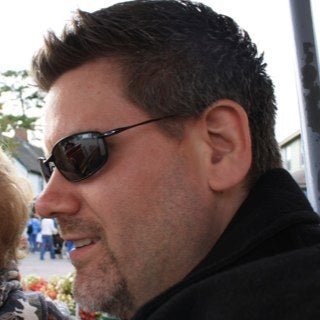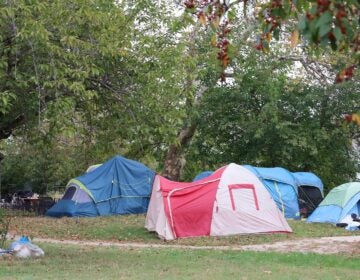Delaware artist offers hope for AIDS victims in Africa

From a small art studio situated upstairs in a home in Milford, Delaware, art is being created that has a huge impact on a small village half a world away.
As you pull up outside this nondescript home in Milford, it’s hard to imagine that the art being created upstairs has such a global impact. This is the office of Downtown Milford Inc., run by Lee Nelson. Upstairs, in the living space he shares with his wife, artist Anne Jenkins, art is taking shape that helps those living thousands of miles and a world away.
Anne Jenkins is a self-taught artist, the only training she has had was the sort you or I would have had in school as a child. To hear Anne tell it, art school wouldn’t have been the place for her anyway, “I’m not very good at taking instructions. So I probably wouldn’t have done well at art school anyway. So I would just buy something and let’s see what happens.”
Anne was born and raised in South Africa, and has lived all over the world. Her inspiration comes from women. “I’m not anti-men or anything. I just think that women are very, very courageous, and they show a great deal of dignity under some very harsh conditions, which I’ve seen all around the world.”
Anne’s work has been shown in various museums and galleries throughout Delaware. Many of her pieces are in private and corporate collections the world over. She is also the Individual Artist Fellow for the Delaware Division of the Arts in the category of Folk Art.
KwaZulu-Natal
Anne Jenkins hails from KwaZulu-Natal, a South African province roughly the size of Portugal along the southeastern tip of Africa. She was born there, and even though Anne has lived all over the world, she still has an affinity for the area. “I lived twenty-something years in Africa, twenty-something years in Europe and twenty something years in the Americas. So I’ve got a vast range of places I’ve lived that come through with me. But my soul really is based in Africa and in South Africa.”
It was here that Anne’s work would come to have such an impact. The AIDS epidemic in Africa really hits home in South Africa, where there are more HIV positive citizens than any other country in the world. KwaZulu-Natal has the highest rate of HIV infection at 39.5%, according to UNAIDS in 2010.
This epidemic is so bad, many homes are without any adults at all, with children having to rely on the help of grandparents, neighbors or outside help to survive. “There’s a whole generation that’s died off. So there’s a lot of the older people, grandparents of that age, who are bringing up the small children because that middle layer of adults has disappeared and died off. It’s a very difficult situation for them, especially in the very rural areas,” Anne says.
Vukuzakhe
A Zulu word, Vukuzakhe, means “standing up and doing it for yourself.” In one village in the region of Amandawe, some of the women did just that. They stood up and approached Anne’s sister Ruth Seipp, and asked for help. “A group of women approached my sister and said that they had no skills and that they had to make some money. They didn’t want to ask for money, they wanted to earn it. And could she help them.”
Ruth is a teacher and a quilter, she worked with the women, teaching them to sew. They started making little traditional landscapes that showcased their lives and heritage. They sent a few of these back to Anne. “I sat and thought that there must be something we can do to help them. And after a lot of thinking we decided to put them on the bags, the tote bags because everybody could use them and it was recyclable. So we started putting them up there and selling them as the bags of hope.”
The proceeds from the sale of the bags, minus the cost of the bag itself is then sent back to the women to help with various activities and projects. The money goes to the Amandawe Supoort Group which works under an umbrella non-profit organization “Umdoni and Vulamehlo HIV/AIDS” to help administer the aid. “They started a soup kitchen to feed the children because there’s a lot of households where there’s just children living there. And to keep the soup kitchen going as well they have started a garden, so they’re growing their own vegetables.”
The bags sell for $30, and while it may seem like a small amount, a little goes a long way. Anne says, “The rand/dollar exchange rate is, at the moment, it’s 10 to 1…They get five thousand dollars, to them it’s the equivalent of giving them like fifty thousand dollars. You can do a lot with that, an awful lot. It really can make a huge difference in their lives.”
Anne has also begun to incorporate the landscapes into larger art pieces, Anne calls this the “Vukuzakhe Project.” This allows her to sell the pieces for more money which of course than allows her to send more money back. There are five of these works left for purchase on Anne’s website. “I wanted it to be two stories. The fabric landscape has its own story and then my painting would have a story, but they would be interrelated.”
A small fish
Anne is able to use her talent and creativity to help people a world away, and she is showing that you don’t have to be a government agency or corporation to help. “I think it’s great. I grew up with the Zulus. I was born and raised there and they helped me when I was a child, look out for me, so I guess it’s my turn to help them.”
Anne, very humbly thinks her contribution to the project is a small one. “I’m such a tiny cog in the wheel really. The ladies out there are the ones who are really doing all the hard work. And I’m just assisting as I can. I’m not even a big fish. I’m just the small one trying to do something. “
“It makes me feel really good and I feel like I’m helping just in my own little small way. And I’m really glad that I could use my art to do so. It’s so much better than just sitting down and writing a check. I’m honoring my background, and being able to help people is really fun. That’s important.”
WHYY is your source for fact-based, in-depth journalism and information. As a nonprofit organization, we rely on financial support from readers like you. Please give today.





